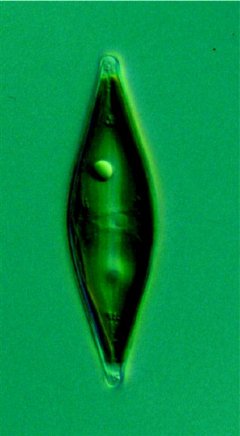Jun 17 2009
Scientists in Canada and India are proposing a surprising new solution to the global energy crisis - "milking" oil from the tiny, single-cell algae known as diatoms, renowned for their intricate, beautifully sculpted shells that resemble fine lacework. Their report appears online in the current issue of the ACS' bi-monthly journal Industrial & Engineering Chemistry Research.
 Microscopic diatoms like the one shown above could yield massive amounts of oil, scientists say. Credit: The American Chemical Society
Microscopic diatoms like the one shown above could yield massive amounts of oil, scientists say. Credit: The American Chemical Society
Richard Gordon, T. V. Ramachandra, Durga Madhab Mahapatra, and Karthick Band note that some geologists believe that much of the world's crude oil originated in diatoms, which produce an oily substance in their bodies. Barely one-third of a strand of hair in diameter, diatoms flourish in enormous numbers in oceans and other water sources. They die, drift to the seafloor, and deposit their shells and oil into the sediments. Estimates suggest that live diatoms could make 10-200 times as much oil per acre of cultivated area compared to oil seeds, Gordon says.
"We propose ways of harvesting oil from diatoms, using biochemical engineering and also a new solar panel approach that utilizes genetically modifiable aspects of diatom biology, offering the prospect of "milking" diatoms for sustainable energy by altering them to actively secrete oil products," the scientists say. "Secretion by and milking of diatoms may provide a way around the puzzle of how to make algae that both grow quickly and have a very high oil content."